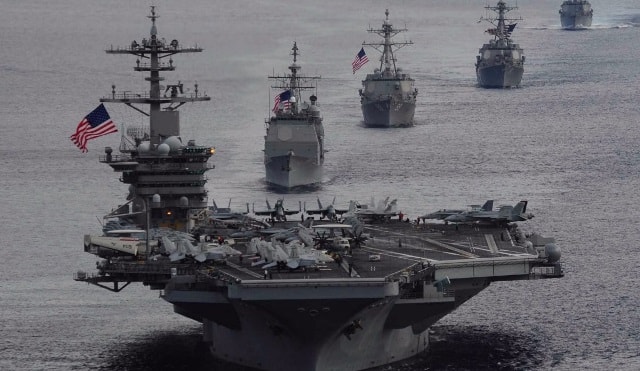Who wins if there is a Sino-US war in the South China Sea?
With the “nine-dash line” rejected, China will now lack legal grounds to chase away US aircraft and warships from “freely patrolling” within 12 nautical miles of its illegal artificial islands in the Spratly Islands, but the two sides may fall into a more dangerous hand-to-hand military struggle.
 |
| The appearance of a US warship in a disputed area in the East Sea has angered China. Photo: Internet |
Since the Permanent Court of Arbitration under Annex VII of UNCLOS issued its final ruling rejecting the “nine-dash line” in the East Sea, China’s most senior generals have all spoken out declaring that they will not succumb to any external pressure and will not abandon their plan to build artificial islands in the East Sea. Meanwhile, the US has sent out an “absolutely clear” message, continuing to patrol disputed areas in the East Sea, considering the establishment of an Air Defense Identification Zone (ADIZ), reclamation and reclamation activities such as Scarborough Shoal (Huangyan/Panatag) in the East Sea to be related to US interests. That confrontation has increased anxiety and tension, leading to conflict and war in one of the busiest seas in the world.
The Australian Financial Review recently asked the question: “If war breaks out over the South China Sea dispute, who will win?” According to the newspaper, 10 years ago, the answer to this question was undoubtedly the United States. Today, purely in terms of firepower, experience and weapons, the United States is 10 years ahead of China. But China is narrowing the gap and its actual military investment is higher than expected. If war breaks out, although the victory is still in favor of this superpower, the United States will have to pay a heavy price because China can cause real damage to the United States.
The US consulting firm RAND Corp believes that in the next 5-10 years, if both the US and China maintain their current defense budget spending levels, Asia will witness a gradual decline in US hegemony. China is accelerating the development of anti-ship missiles, and that is part of China's strategy to force US forces away from the East Sea. Last September, at the 70th anniversary of the end of World War II, China paraded the Dongfeng 21D (DF-21D) missile, which can reach speeds 10 times faster than the speed of sound and can attack moving ships. Thus, together with the YJ-12 ballistic missile (also paraded at the above celebration), China has in its hands a pair of "aircraft carrier killers".
Professor of strategic studies Hugh White of the Australian National University said that the US has much more weapons than China, and they are also much better, but that is not the key issue because the main thing is how to prevent the opponent. And in the process of developing its military, China has always focused on improving the ability to detect and sink US aircraft carriers. "Therefore, if 10 years ago, you affirmed that the US would definitely win (in a war with China). However, now the US is facing the possibility of suffering great losses, even losing an aircraft carrier," Professor Hugh White emphasized.
The CEO of the Australian Strategic Policy Institute, Peter Jennings, also said that China has a strategy to push the US military away from mainland China. Therefore, Beijing has focused on raising the price that the US has to pay and the DF-21D missile is really a great danger to any enemy. However, according to Mr. Jennings, China is still not comparable to the US because the US also has the support of the Japanese Self-Defense Forces. "Over the past ten years, the People's Liberation Army (PLA) has come a long way, becoming a formidable force in the region, but is still far behind the US military in terms of strength," Mr. Jennings commented.
In a similar vein, Zhang Jian, a senior lecturer at the University of New South Wales in Canberra, Australia, argues that China’s priority is to develop capabilities that can inflict damage that would force the US to abandon any attempt to intervene. The key to China’s deterrence capabilities are submarines and ballistic missiles. The problem is that it is very difficult to assess China’s true military capabilities because the weapons it has have never been truly tested. And in a scenario of conventional war in the South China Sea, according to Jennings, China would not be able to resist the US for a long time. In addition to the above problems, one of the reasons is that the Chinese military has not been in battle since the late 1970s.
According to Tintuc
| RELATED NEWS |
|---|

